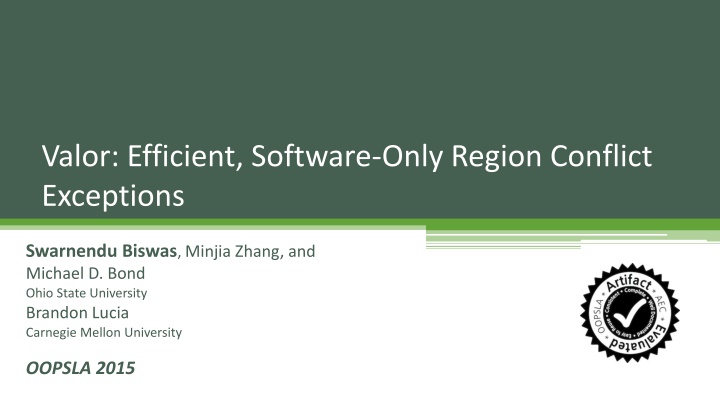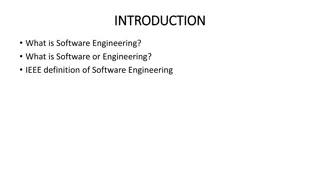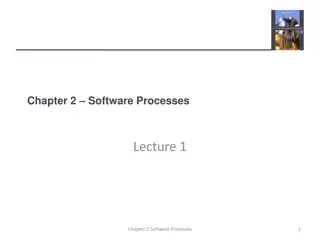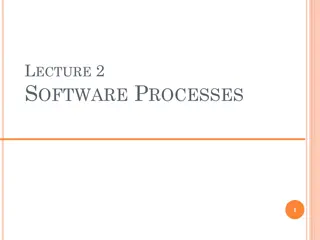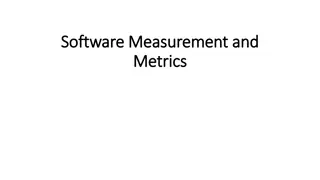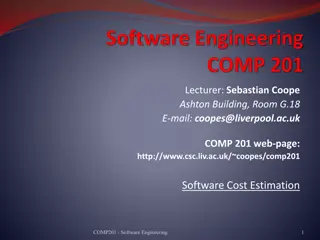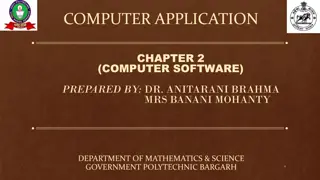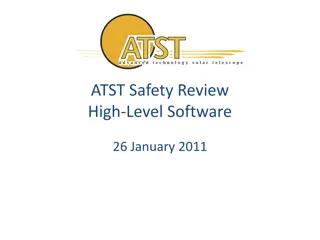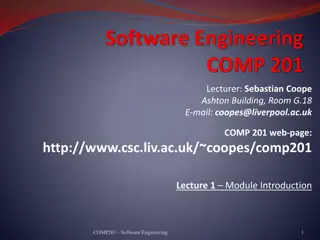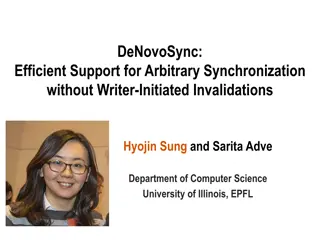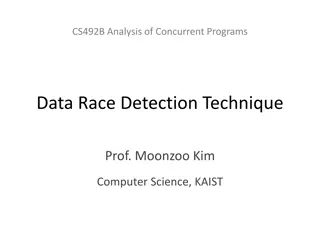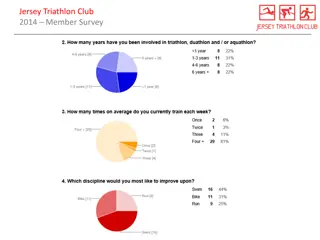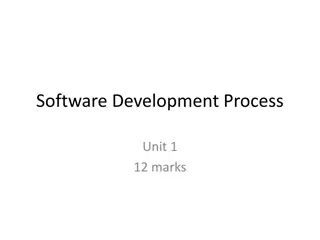Data Races in Software Development
The content discusses the challenges posed by data races in software development, particularly in C++ and Java programs. Data races can lead to unsafe software, complicate language specifications, and make it challenging to ensure correctness in concurrent executions. Catch-Fire Semantics in C++ treat data races as errors, emphasizing the importance of addressing them proactively to prevent issues. Examples and insights are provided to highlight the impact of data races on software integrity.
Uploaded on Sep 11, 2024 | 0 Views
Download Presentation

Please find below an Image/Link to download the presentation.
The content on the website is provided AS IS for your information and personal use only. It may not be sold, licensed, or shared on other websites without obtaining consent from the author.If you encounter any issues during the download, it is possible that the publisher has removed the file from their server.
You are allowed to download the files provided on this website for personal or commercial use, subject to the condition that they are used lawfully. All files are the property of their respective owners.
The content on the website is provided AS IS for your information and personal use only. It may not be sold, licensed, or shared on other websites without obtaining consent from the author.
E N D
Presentation Transcript
Valor: Efficient, Software-Only Region Conflict Exceptions Swarnendu Biswas, Minjia Zhang, and Michael D. Bond Ohio State University Brandon Lucia Carnegie Mellon University OOPSLA 2015
A Simple C++ Program X* x = NULL; bool done= false; Thread T1 Thread T2 x = new X(); done = true; if (done) { x->func(); }
A Simple C++ Program X* x = NULL; bool done= false; Thread T1 Thread T2 if (done) { x->func(); } x = new X(); done = true;
Data Races X* x = NULL; bool done= false; Thread T1 Thread T2 x = new X(); done = true; if (done) { x->func(); } Data race
Data Races are Evil No semantic guarantees Lack of semantic guarantees make software unsafe Complicates language specifications Challenging to reason about correctness for racy executions Indicates other concurrency errors Leads to atomicity, order or sequential consistency violations
Catch-Fire Semantics C++ treats data races as errors X* x = NULL; bool done= false; Thread T1 Thread T2 x = new X(); done = true; if (done) { x->func(); }
Catch-Fire Semantics C++ treats data races as errors X* x = NULL; bool done= false; Thread T1 Thread T2 x = new X(); done = true; if (done) { x->func(); }
Catch-Fire Semantics C++ treats data races as errors X* x = NULL; bool done= false; Thread T1 Thread T2 x = new X(); done = true; if (done) { x->func(); }
A Java Example Thread T1 Thread T2 X = new Object(); done = true; while (!done) {} X.compute();
A Java Example Java tries to assign semantics, which are unsatisfactory Thread T1 Thread T2 X = new Object(); done = true; while (!done) {} X.compute();
C++ and Java Memory Models Data-race-free execution Strong semantics
C++ and Java Memory Models Data-race-free execution Strong semantics Execution is sequentially consistent
C++ and Java Memory Models Data-race-free execution Strong semantics Execution is sequentially consistent Synchronization-free regions execute atomically
lock(l) C++ and Java Memory Models lock(m) Data-race-free execution Strong semantics SFR Execution is sequentially consistent unlock(m) Synchronization-free regions execute atomically unlock(l)
C++ and Java Memory Models But what about data races?
C++ and Java Memory Models But what about data races? ??? Racy execution
Need for Stronger Memory Models Adve and Boehm, CACM 2010 The inability to define reasonable semantics for programs with data races is not just a theoretical shortcoming, but a fundamental hole in the foundation of our languages and systems.
Need for Stronger Memory Models Adve and Boehm, CACM 2010 The inability to define reasonable semantics for programs with data races is not just a theoretical shortcoming, but a fundamental hole in the foundation of our languages and systems. We call upon software and hardware communities to develop languages and systems that enforce data-race-freedom, ...
Outline Programming language memory models and data races Data race and region conflict exceptions model Valor: Our contribution Evaluation
Data Race Thread T1 Thread T2 X = new Object(); done = true; while (!done) {} X.compute();
Data Race Exceptions Thread T1 Thread T2 EXCEPTION X = new Object(); done = true; while (!done) {} X.compute();
Region Conflict Thread T1 Thread T2
Region Conflict Thread T1 Thread T2 wr x
Region Conflict Thread T1 Thread T2 wr x rd/wr x
Region Conflict Thread T1 Thread T2 wr x rd/wr x Conflict
Region Conflict Reports a subset of true data races that violate region serializability Thread T1 Thread T2 wr x rd/wr x Conflict
Execution Models Reports a subset of true data races that violate region serializability sequentially consistent Thread T1 Thread T2 region-conflict- free wr x data-race-free region serializable rd/wr x Conflict
Region Conflict Exception Model GOAL Develop a practical region conflict detection technique
Region Conflict Detection Hardware customizations required for good performance Limited by resources and applicability o Needs extensive modifications and is unscalable1 o Detects serializability violations of bounded regions2 1. Lucia et al. Conflict Exceptions: Simplifying Concurrent Language Semantics With Precise Hardware Exceptions for Data-Races. ISCA 2010. Marino et al. DRFx: A Simple and Efficient Memory Model for Concurrent Programming Languages. PLDI 2010. 2.
Outline Programming language memory models and data races Data race and region conflict exceptions model Valor: Our contribution Evaluation
Valor: Efficient, Software-Only Region Conflict Detector Elides tracking last readers, only tracks last writer Detect read-write conflicts lazily
Valor: Efficient, Software-Only Region Conflict Detector Tracking last writers Detecting read-write conflicts lazily Impact of lazy conflict detection
Per-Variable Metadata Epoch j@T1 Thread T1 Has an ongoing region updated x? j wr x
Tracking Last Writer x p@T0 Thread T1 Thread T2
Tracking Last Writer x p@T0 Thread T1 Thread T2 j wr x
Tracking Last Writer x p@T0 Thread T1 Thread T2 Track last writer j wr x
Tracking Last Writer x j@T1 update metadata Thread T1 Thread T2 Track last writer j wr x
Tracking Last Writer x j@T1 Thread T1 Thread T2 Track last writer j wr x rd/wr x
Tracking Last Writer x j@T1 Thread T1 Thread T2 Track last writer j wr x Conflict rd/wr x
Tracking Last Writer x j@T1 Thread T1 Thread T2 Track last writer Allows precisely detecting write-write and write-read conflicts j wr x Conflict rd/wr x
Valor: Efficient, Software-Only Region Conflict Detector Tracking last writers Detecting read-write conflicts lazily Impact of lazy conflict detection
Detecting Read-Write Conflicts Thread T1 Thread T2 rd x wr x
Detecting Read-Write Conflicts x p@T0 Thread T1 Thread T2 j rd x
Detecting Read-Write Conflicts x j@T1 update read metadata Thread T1 Thread T2 j rd x
Detecting Read-Write Conflicts x j@T1 Thread T1 Thread T2 j rd x wr x
Detecting Read-Write Conflicts x j@T1 Thread T1 Thread T2 j rd x Conflict wr x
Detecting Read-Write Conflicts x j@T1 Thread T1 Thread T2 j rd x This simple mechanism used in prior work has problems Conflict wr x
Remote Cache Misses Due to Tracking of Metadata Thread T1 j Leads to remote cache misses Write operation update metadata rd x
